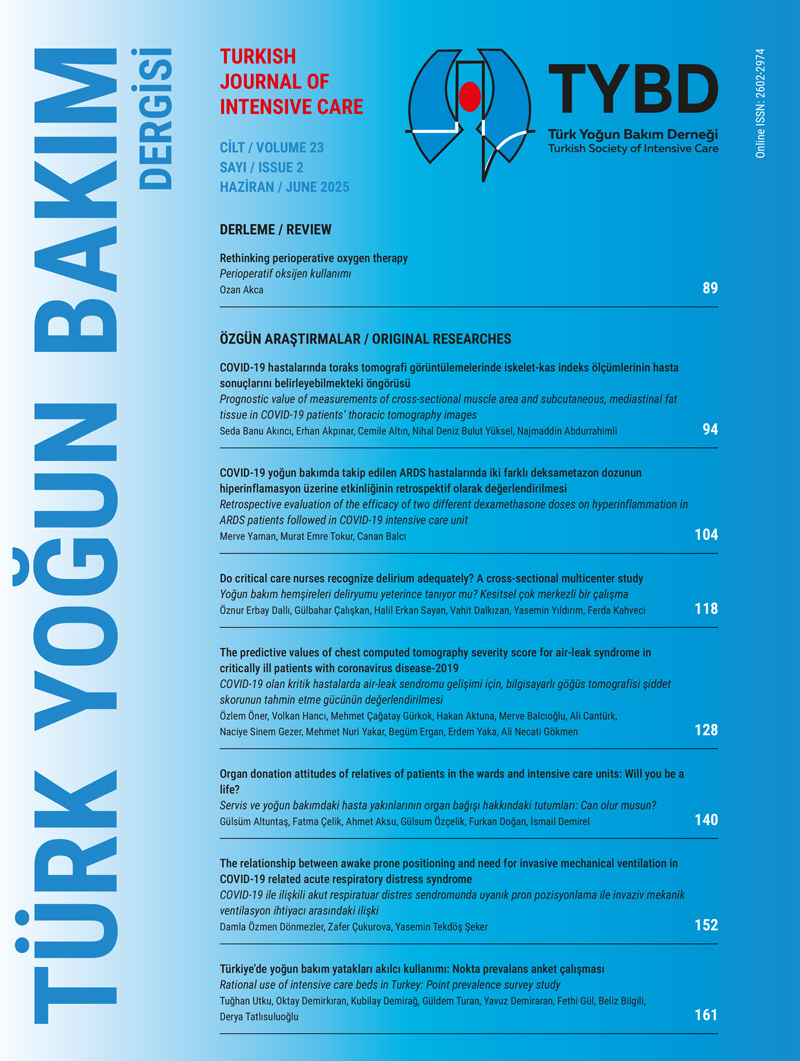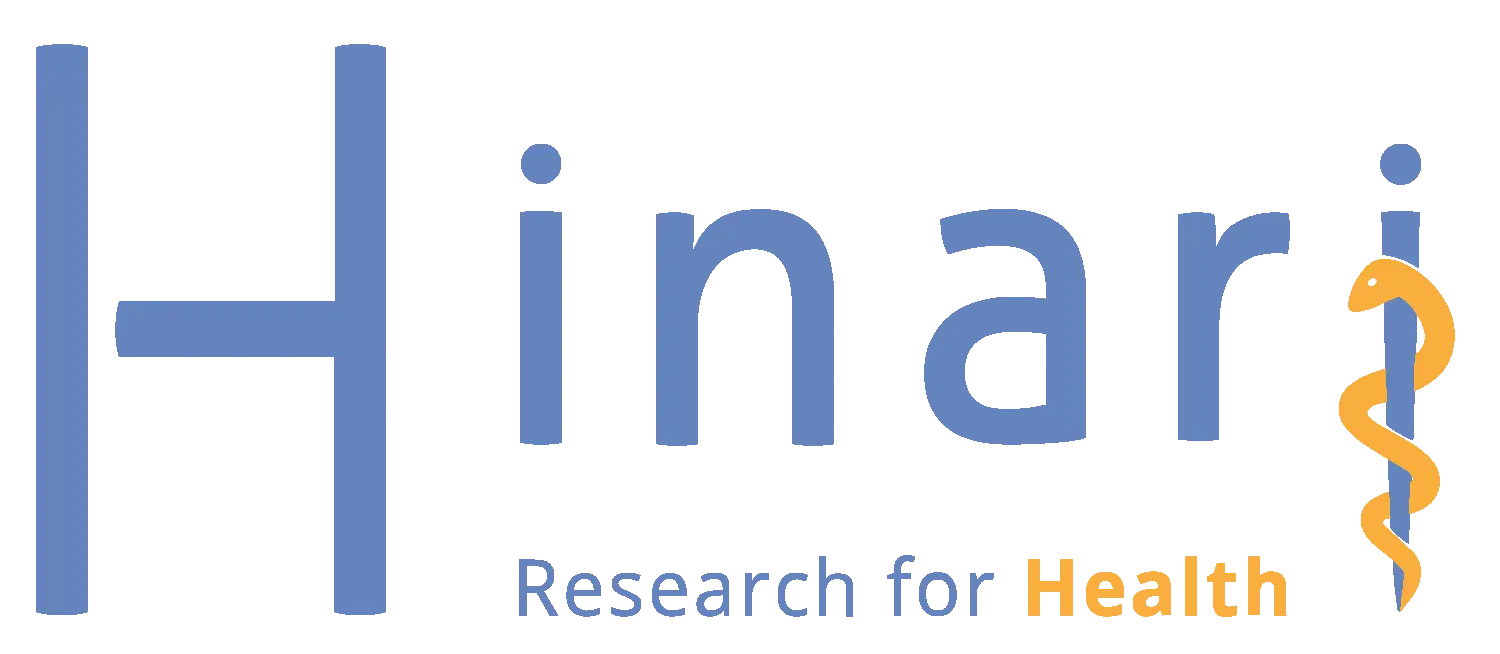Öz
Amaç: Deliryum, yoğun bakımlarda artan mortalite ve bilişsel işlev bozukluğu ile ilişkili yaygın görülen ve sıklıkla yanlış teşhis edilen bir durumdur. Yoğun bakım hemşireleri, deliryumu değerlendirme ve erken teşhis etmede sağlık profesyonelleri olarak eşsiz bir konuma sahiptir. Bu çalışmanın amacı, yoğun bakım hemşirelerinin deliryum bakımı hakkındaki bilgi düzeylerini belirlemektir.
Gereç ve Yöntem: Çalışma Nisan 2022-Temmuz 2022 tarihleri arasında üç hastanede en az bir yıl yoğun bakım deneyimine sahip hemşireler ile yürütülmüştür. Çalışma verileri “Hemşire Özellikleri Formu” ve “Deliryum Bakımı Bilgi Değerlendirme Testi” ile toplanmıştır.
Bulgular: Toplam 253 hemşire çalışmayı tamamladı. Deliryum bilgi düzeyi testine ilişkin genel ortalama puan 10.66±2.29 (aralık 0-16 puan) idi. Testte yer alan konu alanları için doğru cevaplar: (a) semptomlar, tipler ve hasta sonuçları için %71.1; (b) yüksek risk grupları için %71.4; (c) predispozan ve presipitan faktörler için %81.5; ve (d) değerlendirme ve tespit etme için %42.7 olarak saptandı. Yanlış cevap yüzdesinin yüksek olduğu sorular deliryum alt tipleri ve değerlendirme ile ilgili sorulardı. Deliryum bilgi düzeyi skorlarının yaş ve iş deneyimi arttıkça anlamlı olarak arttığı saptandı (p<0.05).
Sonuç: Bu çalışmanın sonuçları, yoğun bakım hemşirelerinin geçerli ve uygun araçlar kullanarak deliryumu doğru bir şekilde tanımlama ve değerlendirme becerilerini geliştirme ihtiyacını ortaya koymaktadır.
Anahtar Kelimeler: kritik bakım, deliryum, yoğun bakım ünitesi, bilgi, hemşirelik
Referanslar
- Wilson JE, Mart MF, Cunningham C, et al. Delirium. Nat Rev Dis Primers. 2020;6:90. https://doi.org/10.1038/s41572-020-00223-4
- Lee G, Roh YS. Knowledge, barriers, and training needs of nurses working in delirium care. Nurs Crit Care. 2023;28:637-44. https://doi.org/10.1111/nicc.12724
- Roh YS. The training needs of Korean intensive care unit nurses regarding delirium. Intensive Crit Care Nurs. 2021;62:102954. https://doi.org/10.1016/j.iccn.2020.102954
- Salluh JI, Wang H, Schneider EB, et al. Outcome of delirium in critically ill patients: systematic review and meta-analysis. BMJ. 2015;350:h2538. https://doi.org/10.1136/bmj.h2538
- Bulic D, Bennett M, Georgousopoulou EN, et al. Cognitive and psychosocial outcomes of mechanically ventilated intensive care patients with and without delirium. Ann Intensive Care. 2020;10:104. https://doi.org/10.1186/s13613-020-00723-2
- Kotfis K, Williams Roberson S, Wilson JE, Dabrowski W, Pun BT, Ely EW. COVID-19: ICU delirium management during SARS-CoV-2 pandemic. Crit Care. 2020;24:176. https://doi.org/10.1186/s13054-020-02882-x
- Ticinesi A, Cerundolo N, Parise A, et al. Delirium in COVID-19: epidemiology and clinical correlations in a large group of patients admitted to an academic hospital. Aging Clin Exp Res. 2020;32:2159-66. https://doi.org/10.1007/s40520-020-01699-6
- Boot R. Delirium: a review of the nurses role in the intensive care unit. Intensive Crit Care Nurs. 2012;28:185-9. https://doi.org/10.1016/j.iccn.2011.11.004
- Özsaban A, Acaroglu R. Delirium assessment in intensive care units: practices and perceptions of Turkish nurses. Nurs Crit Care. 2016;21:271-8. https://doi.org/10.1111/nicc.12127
- Biyabanaki F, Arab M, Dehghan M. Iranian Nurses Perception and Practices for Delirium Assessment in Intensive Care Units. Indian J Crit Care Med. 2020;24:955-9. https://doi.org/10.5005/jp-journals-10071-23502
- Ho MH, Chang HCR, Liu MF, Chen KH, Shen Hsiao ST, Traynor V. Recognizing Intensive Care Unit Delirium: Are Critical Care Nurses Ready? J Nurs Res. 2022;30:e214. https://doi.org/10.1097/jnr.0000000000000487
- Devlin JW, Skrobik Y, Gélinas C, et al. Clinical Practice Guidelines for the Prevention and Management of Pain, Agitation/Sedation, Delirium, Immobility, and Sleep Disruption in Adult Patients in the ICU. Crit Care Med. 2018;46:e825-e873. https://doi.org/10.1097/ccm.0000000000003299
- Erbay Dalli Ö, Akça Doğan D, Bayram R, Pehlivan S, Yildiz H. Practices of the ABCDEF care bundle in intensive care units as reported by nurses: A cross-sectional study from Turkey. Nurs Crit Care. 2024;29:974-86. https://doi.org/10.1111/nicc.12963
- Ho MH, Traynor V, Chen KH, Montayre J, Lin YK, Chang HR. Delirium care knowledge in critical care nurses: A multiple-choice question-based quiz. Nurs Crit Care. 2021;26:190-200. https://doi.org/10.1111/nicc.12608
- Davis LL. Instrument review: Getting the most from a panel of experts. Appl Nurs Res. 1992;5:194-7. https://doi.org/10.1016/S0897-1897(05)80008-4
- Ekolu S, Quainoo H. Reliability of assessments in engineering education using Cronbach’s alpha, KR and split-half methods. Glob J Eng Educ. 2019;21:24-9.
- Rowley-Conwy G. Critical care nurses' knowledge and practice of delirium assessment. Br J Nurs. 2017;26:412-7. https://doi.org/10.12968/bjon.2017.26.7.412
- Zhou W, Zheng Q, Huang M, et al. Knowledge, attitude, and practice toward delirium and subtype assessment among Chinese clinical nurses and determinant factors: A multicentre cross-section study. Front Psychiatry. 2023;13:1017283. https://doi.org/10.3389/fpsyt.2022.1017283
- Awad SA. Critical Care Nurses' Knowledge, Perception and Barriers Regarding Delirium in Adult Critical Care Units. Am J Nurs. 2019;7:193-8.
- Trogrlić Z, Ista E, Ponssen HH, et al. Attitudes, knowledge and practices concerning delirium: a survey among intensive care unit professionals. Nurs Crit Care. 2017;22:133-40. https://doi.org/10.1111/nicc.12239
- Shrestha S, Shrestha S. Knowledge on Intensive Care Delirium among Nurses at Hospital, Nepal. International Journal of Nursing Research and Practice (IJNRP). 2017;4:23-7.
- Skår R. How Nurses Experience Their Work as a Learning Environment. Vocat Learn 2010;3:1-18. https://doi.org/10.1007/s12186-009-9026-5
- Acebedo-Urdiales MS, Medina-Noya JL, Ferré-Grau C. Practical knowledge of experienced nurses in critical care: a qualitative study of their narratives. BMC Med Educ. 2014;14:173. https://doi.org/10.1186/1472-6920-14-173
- Zhou W, Bai X, Yang Y, et al. Revelations of delirium subtype research: A bibliometric analysis of publications in the past twenty years in the field. Asian J Psychiatr. 2023;83:103561. https://doi.org/10.1016/j.ajp.2023.103561
- Menser C, Smith H. Emergence Agitation and Delirium: Considerations for Epidemiology and Routine Monitoring in Pediatric Patients. Local Reg Anesth. 2020;13:73-83. https://doi.org/10.2147/LRA.S181459
- Jayaswal AK, Sampath H, Soohinda G, Dutta S. Delirium in medical intensive care units: Incidence, subtypes, risk factors, and outcome. Indian J Psychiatry. 2019;61:352-8. https://doi.org/10.4103/psychiatry.IndianJPsychiatry_583_18
- Li X, Zhang L, Gong F, Ai Y. Incidence and Risk Factors for Delirium in Older Patients Following Intensive Care Unit Admission: A Prospective Observational Study. J Nurs Res. 2020;28:e101. https://doi.org/10.1097/jnr.0000000000000384
- Krewulak KD, Stelfox HT, Ely EW, Fiest KM. Risk factors and outcomes among delirium subtypes in adult ICUs: A systematic review. J Crit Care. 2020;56:257-64. https://doi.org/10.1016/j.jcrc.2020.01.017
- Papaioannou M, Papastavrou E, Kouta C, Tsangari H, Merkouris A. Investigating nurses' knowledge and attitudes about delirium in older persons: a cross-sectional study. BMC Nurs. 2023;22:10. https://doi.org/10.1186/s12912-022-01158-9
- Byrnes T. Impact of Delirium Education on Medical-Surgical Nurses' Knowledge. J Nurs Care Qual. 2021;36:291-3. https://doi.org/10.1097/NCQ.0000000000000551
- Choi M, DeGennaro R, Blevins C. Multimodal Education Program to Improve Nurses' Knowledge and Confidence on Delirium Recognition in a Surgical-Trauma Intermediate-Care Setting. J Dr Nurs Pract. 2020;13:31-41. https://doi.org/10.1891/2380-9418.JDNP-D-19-00030
- Najafi Ghezeljeh T, Rahnamaei F, Omrani S, Haghani S. The effects of interactive E-learning on delirium recognition ability and delirium-related strain of care among critical care nurses. J Intensive Care Soc. 2022;23:44-52. https://doi.org/10.1177/1751143720972627
Telif hakkı ve lisans
Telif hakkı © 2025 Yazar(lar). Açık erişimli bu makale, orijinal çalışmaya uygun şekilde atıfta bulunulması koşuluyla, herhangi bir ortamda veya formatta sınırsız kullanım, dağıtım ve çoğaltmaya izin veren Creative Commons Attribution License (CC BY) altında dağıtılmıştır.






















